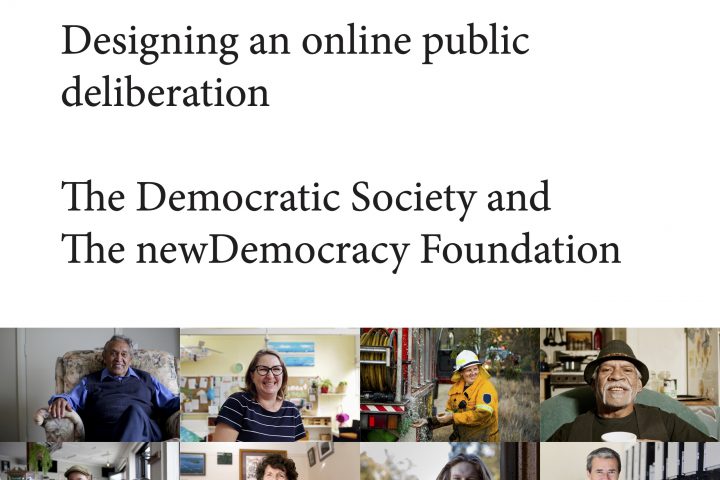This is a conversation in two parts with Chad Foulkes from Liminal by Design and Viv McWaters from Creative Facilitation, both of whom are skilled facilitators. The aim was to replicate an earlier brainstorming session that took place among a larger group of facilitators. The discussion is about how to use the ‘marginal times’...Continue reading
Episode 16 Part 2: Online Deliberation – Group Cohesion with Chad Foulkes and Viv McWaters
This is a conversation in two parts with Chad Foulkes from Liminal by Design and Viv McWaters from Creative Facilitation, both of whom are skilled facilitators. The aim was to replicate an earlier brainstorming session that took place among a larger group of facilitators. The discussion is about how to use the ‘marginal times’...Continue reading
Opinion: a new window has opened for deliberative democracy
By Luca Belgiorno-Nettis, Wednesday May 13, 2020 During this period of the pandemic, many have remarked how well the national cabinet has worked — something it rarely does. It would seem that we need a crisis for politicians to leave politics at the door. Why can’t they do it all the time? Do we really...
Episode 15: Online Deliberation – Design questions with Susanna Haas Lyons
Susanna Haas Lyons has 15 years’ experience, designing and facilitating in both face-to-face and online environments. Here she generously shares her knowledge of multiple tools, as well as expressing her deep concern about how best to achieve equity and include diverse input, as well as building civic capacity. Links for resources mentioned by Susanna:...Continue reading
Episode 14: Online Deliberation – Learning online with Leanne Piggott
Leanne Piggott is an award-winning and highly-skilled curriculum designer and university teacher. Public deliberations require deep learning by participants who come to a gathering with different levels of knowledge and understanding about a topic. As facilitators increasingly move public deliberations online, understanding the principles of transformative learning has become even more important. Anything less...Continue reading
Designing an online public deliberation
This note, created by the newDemocracy Foundation in Australia and The Democratic Society in Europe, sets out how some of these challenges can be addressed, not through a simplistic digitisation of offline methods, but by creating assemblages of tools and techniques that realise the maximum benefit of online tools while preserving the qualities that make offline deliberation a recognised gold standard.Continue reading
Episode 13: Online Deliberation – A case study with Emily Jenke
Emily Jenke is a very experienced facilitator of public deliberations. She is a Co CEO of democracyCo. In early 2020 she was taken out of her comfort zone when Covid-19 forced the world into physical isolation. Emily and her colleagues were mid-project, having started face to face. They were now forced online. This...Continue reading
Episode 12: Online Deliberation – Opportunities and Challenges with Graham Smith
Professor Graham Smith is a Professor in Politics at the University of Westminster, London. Graham has a wealth of experience with deliberative democracy. The COVID-19 pandemic led to some swift re-design among those who facilitate face-to-face public deliberations. In this episode, Graham Smith raises many interesting questions and offers some warnings as well....Continue reading
Episode 11: Facilitator training with Oliver Escobar
Dr Oliver Escobar is an academic at the University of Edinburgh and has offered training in facilitation for public deliberations for more than a decade. It is this training that provides the focus of the podcast conversation. Oliver is unusual because of this combination of scholarship and being an experienced trainer. In this interview, he explains...Continue reading
Episode 10: Deliberative processes and democracy with Matthew Taylor
Matthew Taylor is the Chief Executive of RSA, an organisation whose people are thinking about new models for change, influencing policymakers, practitioners and the public to effect long-lasting change. In this podcast, recorded in 2019, Matthew talks about building mandates for change while ‘thinking like a system and acting like an entrepreneur’. The...Continue reading



